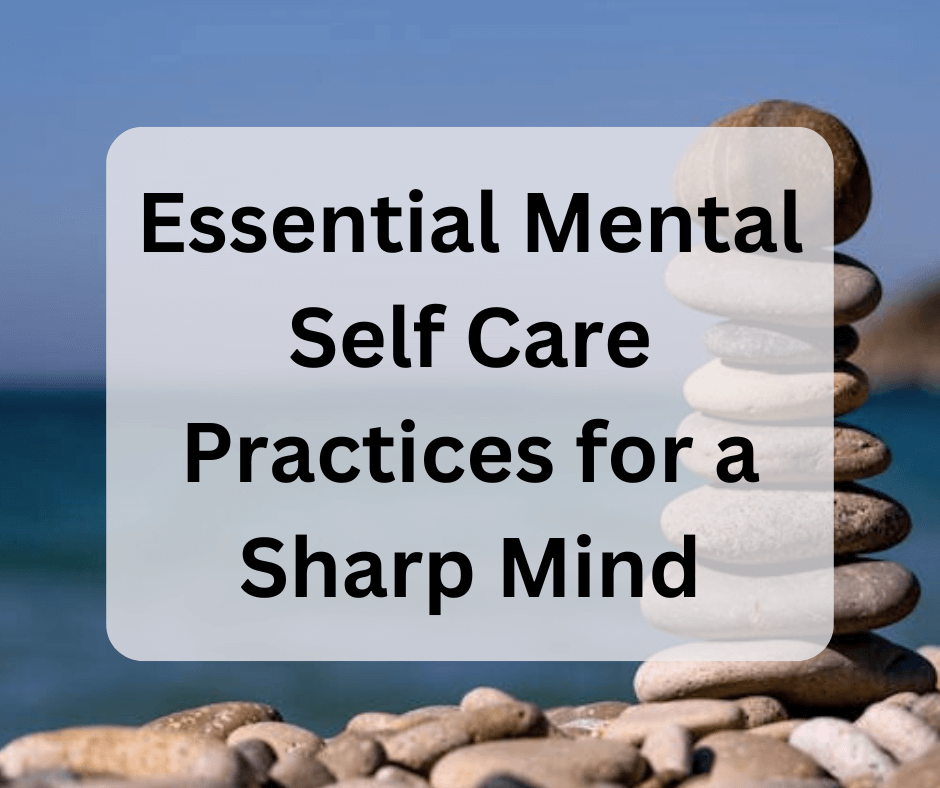Taking care of our mental health is just as crucial as healthy eating and exercising, but it’s often overlooked in our busy lives. Mental self care is about intentional practices that nurture our psychological health and emotional balance.

With rising global stress levels and increasing awareness about mental health, it’s more important than ever to understand how to effectively care for your mind.
Let’s explore practical, evidence-based strategies that can transform your mental well-being and help you thrive in all areas of life.
What Is Mental Self Care
Mental self care is about adopting habits that promote and maintain mental health. There is a strong connection between self care and mental health. Regular mental self care practices help improve self esteem, self worth, and reduce feelings of anxiety and depression. This leads to better decision making and better life choices. Basically. it is a commitment to your mental health.â
Despite what some people may think, mental self care is not selfish. Setting boundaries is not meant to push people away or disrespect their needs. Rather, it’s a way of respecting your own needs and limits. Besides, you can reinforce boundaries in a respectful way, by communicating why this matters to you and by encouraging the other to do the same.
Mental self care is not time-consuming either. Although it may seem like an inconvenience to set time aside for a therapy session in the moment, it might cost you more in the long run. Every minute you spend on mental self care in the present is an investment in your mental well-being in the future. It prevents anxiety, depression or burnout – so I’d say it’s worth it.
Signs You Need More Mental Self Care
It’s good practice to look after your mental hygiene on a regular basis. But if you are at risk of mental exhaustion and burnout, this is paramount.
Here are a few signs you need to focus on your mental health right now:
- you are easily irritated, often by things other people barely notice
- you have lost your excitement for hobbies or interests that used to energise you
- you lost motivation to achieve your goals, or you abandoned your goals altogether
- you eat too much or too little
- you aren’t looking after your physical health, skipping or missing doctor’s appointments and regular check-ups
- you lack self confidence
- you are overly cynical
- you avoid social interaction
- you are unable to focus
All these signs show you are close to burning out and you need more mental self care in your life. Start small, especially if you are feeling exhausted. You are not going to be able to sustain a demanding routine and you will feel discouraged immediately.
Try instead to introduce small habits that take less than 15 minutes.

Daily Mental Self Care Practices
So how can you care for your mental well-being on a day-to-day basis? Let’s have a look at a few practices you can start incorporating in your daily routine right now!
Mindfulness Meditation
This is the easiest step you can take in your mental self care journey, because I’s so handy. There is no shortage of apps and videos online for guided meditation. You don’t have to learn anything, just press play and follow the instructions.
Research has shown that a regular mindfulness meditation practice is highly effective in reducing stress, anxiety and depression. Some studies have shown that mindfulness can help with physical symptoms as well, for example by reducing pain and fatigue.
Journaling
Journaling is also a great tool to have in your arsenal when working on your mental well-being. In fact, many therapists use journaling with their clients and patients.
Here are a few prompts you can use in your daily journaling practice to support your mental health:
1. What were you doing the last time you felt happy? What could you do to replicate that?
2. Write a letter to yourself, focusing on kindness, understanding and forgiveness.
3. What boundaries could you set in your relationships to make you feel more safe or relaxed?
4. What pain or uncomfortable feeling are you trying to avoid at the moment?
5. Are there any recurrent thoughts or emotions that are not serving you? What are they? How did they make your way into your daily life, and what can you do to release them?
Gratitude Practice
Practising gratitude on a regular basis helps you re-focus your mind on the positive aspects of your life. Because no matter how bad things get, it’s never all doom and gloom. Rather, it’s our exhausted minds telling us that.
Try gratitude journaling to re-frame the narrative and remind yourself of the blessings you still have in your life. Here are a hew prompts you can use every day:
1. List 3 people hose presence makes your life better, safer, happier.
2. What do you value most in your relationship with your partner?
3. What do you value most in your friendships?
4. What do you value most in your relationship with your family?
5. List 3 small moments of joy you experienced today.
Digital detox
Unfortunately, the screens aren’t our friends. It’s been well documented now, and I think we all agree, that excessive use of technology is ruining our mental health. Social media usage has a great impact on our self esteem and self worth, our attention span and our ability to form meaningful and rewarding connections with other people.
So reducing your exposure to screens seems like the next logical step.
- Take time every day to unplug.
- Be conscious of your screen usage and set limits for your most tempting apps.
- Create an evening routine that doesn’t include screen-time. Focus on reading, meditation, journaling or talking to your partner instead.
Here are a few more ideas on how to create a digital detox routine for yourself and stick to it.
Boundaries
Set boundaries with your friends and loved ones, but also in your professional life. If there are behaviours that are hurting you, communicate it.
Let them know that certain words or behaviours are not accepted anymore, and explain what effect they have on you. This way, they can understand your motivation and your new boundaries don’t seem like they came out of nowhere.
And if you feel uncomfortable about having these conversation, think about how much more uncomfortable you will feel when this behaviour repeats itself again and again. Learn to view boundary setting as a practice of self respect.
The Connection Between Physical Health and Mental Self Care
While you are implementing new practices to care for your mental well-being, please don’t forget about physical health. Your mind lives in your body, it is a part of it. The state your body is in affects your mental state.
Nutrition impacts your mental health. 95% of your serotonin is produced in the gut. Its function, as well as the function of your neurons, is influenced by the bacteria in your gut. So you want to make sure what you eat is nutritious, rich in fiber and non-inflammatory.
On top of that, physical exercise has been proven to reduce anxiety and depression symptoms, in many cases being as effective as medication. Shorter, high intensity exercise programs produced the greatest effect. Which is good news for those of us who always feel like we’re running out of time in our schedules.

Physical activity releases endorphins (the feel-good hormone), boost self confidence and improves sleep quality. So get your workout equipment ready, and book time in your day for this self care practice!
Professional Support for Mental Health
Last but not least, please don’t hesitate to seek professional help.
There is no shame in asking for help when you need it. Nor is there any shame in preventing that moment form happening. A regular therapy practice is a great way to care for your mental hygiene, guided by a qualified professional.
Conclusion
Incorporating mental self care practices into your daily routine isn’t just a luxury, it’s essential for maintaining optimal well-being in our demanding world. Start implementing the strategies we’ve discussed, and you will build remarkable resilience against life’s challenges.
Remember that mental self care is personal. Experiment with different approaches to discover what works best for you. Start with just one practice today, and notice how even small changes can lead to significant improvements in your overall quality of life and mental well-being.


Thank you for sharing this really helpful and practical post!
Thank you for sharing this really helpful and practical post!
This is such an important article! It can be SO easy for those little negative signs to pop up but often we are so busy or just pushing on that we don’t notice them until things start feeling a lot worse! Thank you for sharing this!
You are so right! Too often we start doing the work when it’s already too late. And then the work is so much harder.
Reading this, I realize that I have not taken care of my mental health in recent times. I wrote down the journaling and gratitude questions. Hopefully, I will manage to get into journaling again. I find it so difficult. Thank you for this inspiring post and for making me realize I need to get a move on. ♥